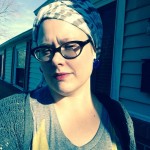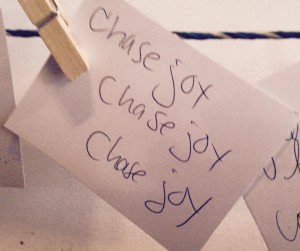I came across an essay called, “Joy,” from writer Zadie Smith. This was a timely find as I woke up to 2015 with this motto: chase joy! Smith starts the essay highlighting the differences between pleasure and joy, which I agree requires necessary distinction. She suggests that pleasure is comprised of small things. I’ve spent the past two years chasing various sorts of pleasures, some as banal as a good cup of coffee. Other pleasures I’ve sought are better suited for a different sort of essay.
Pleasure come as little morsels: a bite of something delicious, a moment of sexual fulfillment, that feeling when your child says something brilliant. Joy, however, seems organic and somewhat elusive. As Smith writes, “The thing no one ever tells you about joy is that it has very little real pleasure in it. And yet if it hadn’t happened at all, at least once, how would we live?”
But live we must do, and my attempt at chasing joy is partly about being present in the fullness of my life. There is a predicament, however: at times, my life feels quite empty and so devoid of joy that I fear it might be hard to recognize upon arrival.
It occurred to me that finding joy could require surrendering to the moment — you know, in the manner Eckhart Tolle suggests that we must do. Say yes to the present, he urges. Be here now, and practice gratitude. This sounds like an experiment similar to the daily prayers that I try, but often fail, to perform five times a day.
Here is the catch: how can I chase a concept while also surrendering to the conditions of my life [current status update: broke, single, and confused]. The joy chase feels like a spirited verb, while the idea of surrendering slouches like a soggy gerund. I want a pursuit that leads me right on out of here and towards a place beyond my present moment.
The chase and the surrender are in a boxing match. One screams, go get. The other says, just be. I’m like, oh, hell!
***
Recently, on a warm winter day, I met a friend for a walk. We both wore yoga pants that we had slept in the night before. I donned all black. She stood glorious in tank top and a pair of leather UGG boots. We looked like we were trying to be punk about the exceptionally sunny afternoon, and stomped about with too much urban mirth for our own good. You need to know that my friend is exceptionally beautiful in mind, body, and spirit. She embodies an elegance that makes people look twice. Her soul is so rich that lesser men are sometimes blinded after looking a third time. She is one of many luminous women writers I know, rapturous with so much possibility and warmth that they often find themselves bigger than the spaces they inhabit.
Still, my friend recognized that her current life was “awash with blessings, and yet.” She wondered what was coming: a job, a new city, an ending to her current story.
Another thing you need to know is that she is working on her first book, and its release later this year will make her life awash with new and wonderful things. She had seen the cover a few days prior. “It is real now,” she said. “And yet.”
She hasn’t figured out the ending.
It makes sense for two writers on a walk in the wood to steer conversation to writing craft, deadlines, love. I don’t know my story’s ending, either. I don’t even know the beginning. And that is what keeps me from getting on with my memoir. “I wish I could end with romance,” I lamented. “But how is that going to happen? I can’t even get a date, so asking for something decadent like love seems far-fetched, something in the realm of fiction. I’m writing a memoir, so there is that.”
She laughed and threw her head back with so much incandescence that I’m sure the sun had to squint.
“We all want the love story, right? Every woman writing wants an Eat. Pray. Love. I know I do,” she said.
I replied with a forlorn sigh. “We want eat, pray…something! I mean, there are limits to what we can know about ourselves in solitude.”
She absolutely believed in the concept of cosmic love, of being open to the universe walking in to take care of her needs, even in times of loneliness. Yet, she honed in on an urgent truth: “But, I want a man in my bed. I want someone to read the Sunday edition of the New York Times with me. I want that kind of love, too.”
Romantic love is the litmus for self-fulfillment, the pinnacle of pleasure and joy. We can have the most horrible of circumstances, but our place in the world seems valid if someone loves us. Nothing brings more elation than someone really looking hard at our being and then unabashedly celebrating all that they see.
***
The weirdest thing sometimes happens: I have flashbacks to my married life. I will remember the smell of a particular day in Pakistan, or how the gravel sounded in front of a bakery in Bahrain. These memories arrive without warning and with such ferocity that my knees buckle. It is a type of PTSD concerning events that held no trauma or unhappiness at all. Yet, their appearance suggests a rupture, a type of epistemological violence, between my old self and the way forward.
There was a time I had a passport and the constant possibility of another country, a new set of stories. So much of my identity invested completely in a life filled with geographical cures every few years. I had the opportunity of undressing my American self for other masks. My marriage offered these gifts, and once I left, I surrendered to a poverty so compelling that renewing my passport, much less travel, is now impossible. If anything makes a world small and fixed, it is the lack of financial resources to move through time and space.
Meanwhile, my ex husband is ascending in the world with new opportunities – and well-deserved ones, mind you. Formerly single friends are finding partners. Other acquaintances are moving away to new jobs. I often have to fight the feeling that opportunity stopped when I left my marriage.
I recently wrote to a friend, someone who writes about love and surrender, with a confession: My worst fear is that I’ll end up as some woman in a trailer park who once had a fascinating life story but just couldn’t make it.
In moments such as these, I am reminded that every journal entry from my married years highlighted profound unhappiness, even with all the graces of a globalized life. Despite passports and a kind spouse, I lived in an inauthentic shell, an existence devoid of bliss even if awash with things. One phrase appeared in journal during my marriage with such jarring regularity that, upon rereading years later, I was moved to tears: I hate my life. I hate who I am becoming.
Sometimes, when my husband went away on business, I’d put on my headphones and dance around my dark bedroom. I was so full sweaty happiness that I didn’t know what to do with myself. I wished, how I wished, that I could let him see me do this. Yet, my discomfort in sharing this fierceness left me with unexplained anxiety. I could never, ever show him such unbridled, vulnerable rapture.
My writer friend responded to my fear-laden email with sisterly compassion. Dear Deonna, she wrote, your story BEGAN the day you left your marriage. That moment — the surrendering of a life — was walking into a wide space of courage and writing, a world where I could create my own reality beyond being the wife of so-in-so. What stretched before me now was an uncontested path to all things possible.
***
In the wood on that sunny day, my friend confronted me with a challenge. “Writing brings you joy. Chase that. Get back to your memoir,” she urged.
I cringed and offered the pithiest excuse I could muster. “I don’t know how. Nothing has turned out like I expected. I didn’t become who I’d thought I’d be. I don’t know my story.”
Maybe, she said, the whole point of life, writing and chasing joy was not about becoming anything at all. Perhaps the chase is about unbecoming. “Isn’t that what it is about? Letting go of all the things we thought we needed and wanted? That is your story — you’ll write your way into a new becoming. Your story is so compelling that wherever you take the reader will be okay.”
She was right, of course, about the writing part. When I let myself fall into writing, — really, really fall – the most wonderful things occur. Writing becomes a lover that sees the all of me. The process is sometimes a painful excavation of discovery that, with patience, yields rapturous joy.
My body does a strange thing when I write something beautiful, or when I unearth a personal truth within the prose. It can’t sit still. I have to get up and move.
My limbs plow through the air with abandon. I am released from the temporal limitations of my existence. In that moment, I feel none of self-hate, the harsh criticisms,that serve as my constant daily companion. What is this feeling, this desire to fling about in my tiny apartment? It is the same private ritual that I used to enjoy in the dark rooms of my marriage, the one that I didn’t want my husband to see.
I can now name the dance: it is an unbecoming act, an exercise of elation. Here I am, being present in a moment fat with gratitude and awash with blessings. This is no small morsel of pleasure. The dance is an arc of pure, fantastic bliss. It is a submission to the absence of limitations.
Zadie Smith suggests that joy is such a human madness. I feel the chase is also something else: it is a surrender to hope.
________________
 Deonna Kelli Sayed is a Love, Inshallah contributor and producer of the site’s author interview podcast. She is a published author and currently working on a memoir with support a 2013 Regional Artists Grant from the North Carolina United Arts Council. Deonna recently launched A LITTLE PODCAST, an audio project exploring intersections between story, personalities, and Third Space. To learn more about Deonna, visit her website, and join her on Facebook and Twitter.
Deonna Kelli Sayed is a Love, Inshallah contributor and producer of the site’s author interview podcast. She is a published author and currently working on a memoir with support a 2013 Regional Artists Grant from the North Carolina United Arts Council. Deonna recently launched A LITTLE PODCAST, an audio project exploring intersections between story, personalities, and Third Space. To learn more about Deonna, visit her website, and join her on Facebook and Twitter.













